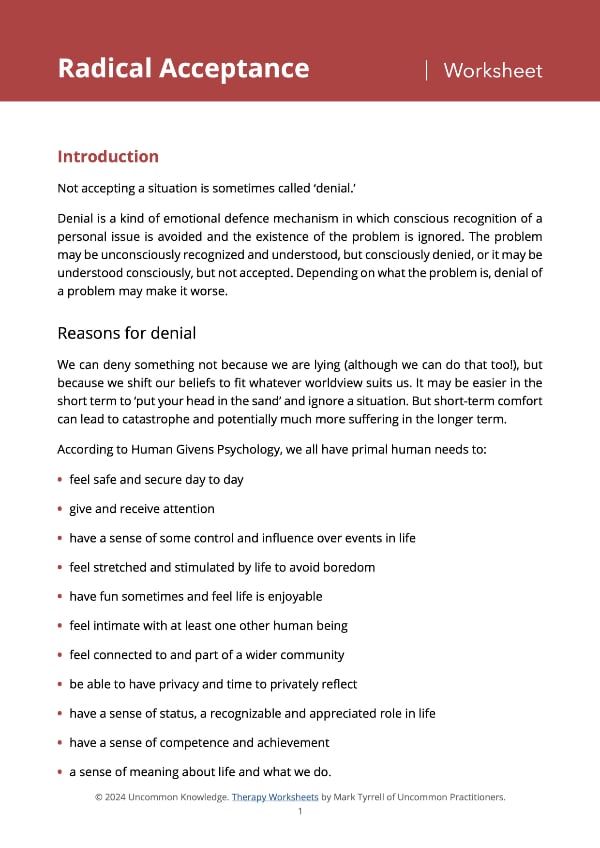
Radical acceptance means fully accepting reality as it is, without judgement or resistance, even if it's not what you want it to be.
“Your patients are afraid of the truth and they try to beat around the bush.”
– Milton H. Erickson, MD
A woman I knew back in the 1980s, a friend of my girlfriend, found a lump on her skin. She ignored it. She pushed it to the back of her mind, denying to everyone that it needed attention. She waited six months, then a year. As it still hadn’t gone away and had, in fact, grown bigger, she went to her doctor “to please her mom”. It was cancer, and she died not long after.
I have no idea how treatable her disease was or whether early detection would have saved her. But the point is, she evidently found it more comfortable to live a fiction than to confront reality.
Sometimes we see this kind of cognitive dissonance or denial in our clients. Here’s another case in point.
“But I only eat salad!”
This is a weird one.
Early in my career I was downtown walking past a shopping mall when I noticed a very distinctive looking woman with bright pink hair standing not far from a bakery eating a huge cream cake. She seemed to be relishing the gateau and making short work of it. I didn’t judge her, I simply thought, wow, that cake looks good!
The very next day I was to see a weight-loss client for the first time… and I think you know where this is going!
Even before I’d opened the door, through the glass I saw a flash of pink. Moments later, that same woman I’d noticed the day before sat before me.
Robyn informed me plaintively that she couldn’t understand her weight gain since she never ate fattening foods. In fact, she informed me unblinkingly, she barely ate anything other than salad. I was loath to inform her I’d seen her the day before in town chomping down on a very substantial cake!
Was she lying to me, or to herself?
Prefer to watch instead?
Repeat a lie often enough and it becomes the truth
Or at least it starts to feel like the truth.
We can deny something not because we are lying (although we can do that too!) but because we shift our beliefs to fit whatever worldview suits us most comfortably. There is often a kind of short-term thinking to this. If I ignore the approaching waterfall and carry on paddling calmly, maybe I won’t have to deal with that threat… except I will.
- “That cream cake ‘doesn’t really count’ because I’d walked 5 kilometres that day!”
- “That pack of cigarettes I smoked this afternoon? Well, today is different because I’m nervous about my upcoming interview!”
See how we shift things around? Beliefs shift to deny reality. Deckchairs get rearranged on the Titanic, and suddenly things seem a whole lot easier. We plant our heads firmly in the sand, and leave important problems undealt with.
But short-term comfort can lead to catastrophe, and potentially much more suffering in the longer term.
The problem may be unconsciously understood but consciously denied, as with cognitive dissonance, or it may be consciously understood but not accepted:”Yeah, yeah, I know I should really drink less… but you only live once!” Either way it is ignored and remains unaccepted.
Now like most things in life, sometimes non-acceptance might actually help us.
Never say never
Sometimes not accepting some aspect of life may drive us to ‘do the impossible’ (which, of course, turns out to have been possible all along!).
Not accepting defeat or failure may drive us to find a way to win and succeed. Those who just don’t know when to quit or don’t accept some limitation placed upon them by others can sometimes amaze us all.
Deciding to “accept your age” may mean not keeping as fit or being as adventurous as you might be. So a bit of non-acceptance might be a good thing if acceptance means complying with limitations that may be overly restrictive or pessimistic.
Equally, though, depending on what the problem is, non-acceptance of a problem may make it worse. But there’s something else here.
We need to see what is to make what might be
If we don’t at least know or acknowledge a situation or problem, we haven’t even reached the starting line as far as solving or resolving it is concerned.
I’m more likely to go get an umbrella if I recognize and acknowledge that it is in fact raining cats and dogs than if I stand there getting drenched, all the while steadfastly denying what’s happening. A diabetic is more likely to improve their diet if they accept that they are in fact diabetic, and that diabetes can severely damage them.
So acceptance doesn’t mean defeat; rather, it means practical alignment with truth so we can actually do something!
So what, then, is “radical acceptance”?
Radical acceptance: the art of embracing what is
Radical acceptance is a concept often associated with dialectical behaviour therapy (DBT), a type of psychotherapy developed by Marsha M. Linehan. It refers to fully accepting reality as it is, without judgement or resistance, even if it’s not what you want it to be.
So what does radical acceptance look like?
Here are two examples you can use with your clients, which are also included on the Uncommon Knowledge Radical Acceptance Worksheet:
Example one:
- Non-acceptance: John smokes 50 cigarettes a day and is finding that more and more often he has trouble breathing and feels tired and depressed. He tells you that “many people smoke all their lives and live to 100!” and he doesn’t feel cigarettes will harm him!
- Radical acceptance: John learns to feel safe and secure in other ways which don’t harm him. He comes to see that smoking is harming him and eventually kicks the habit. He feels happier and safer.
Example two:
- Non-acceptance: Sylvia’s boyfriend has ended their relationship, telling her he no longer loves her. She is devastated and six months later insists he does still love her, that they are meant to be together and that his new girlfriend doesn’t really mean anything to him. She constantly calls him and hangs about his place of work hoping for a reconciliation.
- Radical acceptance: Sylvia comes to realise that her ex really has moved on. She starts to meet her needs for intimacy and meaning through friends and her work, and eventually meets someone new.
So how can you help your clients who may need to develop radical acceptance?
Step one: Explore what needs they may have been meeting though non-acceptance
As you know, we all have an array of emotional needs which, when met, help us survive and thrive in the world. Thanks to Human Givens psychology, we now understand these needs better than ever. As a reminder, these needs are:
- to feel safe and secure day to day
- to give and receive attention
- a sense of some control and influence over events in life
- to feel stretched and stimulated by life, to avoid boredom
- to have fun sometimes and feel life is enjoyable
- to feel intimate with at least one other human being
- to feel connected to and part of a wider community
- privacy and time to privately reflect
- a sense of status, a recognizable and appreciated role in life
- a sense of competence and achievement
- a sense of meaning to life and what we do.
Paradoxically, denial about chronic smoking may be rooted in the need to feel safe and secure. We might feel safer when we diminish our appreciation of how deadly this behaviour is for us, as it can feel scary to accept the truth.
Or perhaps smoking connects us to a community of other smokers, and we fear if we stopped we’d lose the completion of that very important need… and so on.
Non-acceptance that one’s best days are over as a top-level sportsperson may be driven by an unconscious drive to maintain a sense of status.
So ascertain with your client, if you can, what needs the non-acceptance may have been meeting for them, and seek to help them meet those needs in other healthier ways. It could be any one or a combination of the above.
But as always, we need to go about things in the right way.
Step two: Explore, don’t force
No one likes to be made to feel like a fool. Telling someone starkly that they are lying to themselves may have them defending that denial more strongly than ever.
We human beings may sometimes fight for our own limitations, which is why complimenting someone with low self-esteem may have them working against not with you.
So rather than bluntly announcing to a client, “You’re kidding yourself about this!” we might simply discuss with them how people in general can sometimes feel more comfortable not looking at the full picture of things. We can ask them Socratic questions such as:
“What might your (deceased) mother, who loved you deeply, say about the way you’ve been eating with diabetes? Would she agree with you, do you suppose, that it’s fine to eat like that?”
Or simply:
“Would everyone, do you think, agree with you that your relationship isn’t abusive, or might some people think it is in some ways? What might those people say about it?”
On the Radical Acceptance Worksheet you’ll find exercises to work through with your client that can help them identify the pattern of denial in other people’s scenarios and thereby see themselves more objectively.
But we can develop the skill of self-objectivity even further.
Step three: Encourage mindful self-detachment
Remember Robyn, the cake-eating woman with the pink hair?
Robyn was a lovely, kind, interesting, and funny woman. But she hadn’t told me or herself the truth of her cake consumption. She’d neatly and comfortably dismissed that particular slice of reality as immaterial.
I used mindful hypnosis with her to amplify her sense of self-compassion and “honestly observe” everything she put into herself during a typical day. She didn’t have to share any of that with me; it was none of my business exactly what she’d been consuming. I was simply asking her to be honest with herself, not with me.
I asked her not to judge or condemn but to just watch herself objectively, “honestly and with self-compassion,” to “learn from yourself all that you consume.” I suggested that perhaps “some of that might surprise you if you haven’t been noticing all that before.”
I suggested that a wise part of her knew “the truth of things as they really are” and that it might feel like a relief to see this truth and start to “respectfully consider” what she would, from here on in, put into herself.
Mindful hypnosis can blend the detachment and calm of meditation with the dynamic flow of hypnosis.
Towards the end of the session, Robyn told me she hadn’t realized before just what she’d been eating day to day.
She didn’t elaborate, and I never mentioned I’d seen her the day before our first session scoffing down that vast cream cake like she was attempting the world record for speed eating!
But she did start to become slimmer, and seemed happier.
The consolation of seeing truth, no matter how hard it is to bear, is so often a sweeping sense of sweet relief as pretence falls away and we let reality in.
Join our ‘Netflix for Therapists’
Uncommon Practitioners’ TV is a visual learning platform for therapists, counsellors and coaches to further skills and gain CPD hours. UPTV contains more than 100 videos of Mark working with clients, skills training videos and much more. Read more about UPTV here.






